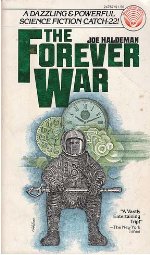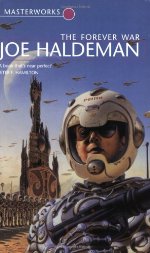The Forever War
by Joe Haldeman
AUTHOR’S NOTE
This is the definitive version of The Forever War. There are two other versions, and my publisher has been kind enough to allow inc to clarify things here.
The one you’re holding in your hand is the book as it was originally written. But it has a pretty tortuous history.
It’s ironic, since it later won the Hugo and Nebula Awards, and has won “Best Novel” awards in other countries, but The Forever War was not an easy book to sell back in the early seventies. It was rejected by eighteen publishers before St. Martin’s Press decided to take a chance on it. “Pretty good book,” was the usual reaction, “but nobody wants to read a science fiction novel about Vietnam”. Twenty-five years later, most young readers don’t even see the parallels between The Forever War and the seemingly endless one we were involved in at the time, and that’s okay. It’s about Vietnam because that’s the war the author was in. But it’s mainly about war, about soldiers, and about the reasons we think we need them.
While the book was being looked at by all those publishers, it was also being serialized piecemeal in Analog magazine. The editor, Ben Bova, was a tremendous help, not only in editing, but also for making the thing exist at all! He gave it a prominent place in the magazine, and it was also his endorsement that brought it to the attention of St. Martin’s Press, who took a chance on the hardcover, though they did not publish adult science fiction at that time.
But Ben rejected the middle section, a novella called “You Can Never Go Back.” He liked it as a piece of writing, he said, but thought that it was too downbeat for Analog’s audience. So I wrote him a more positive story and put “You Can Never Go Back” into the drawer; eventually Ted White published it in Amazing magazine, as a coda to The Forever War.
At this late date, I’m not sure why I didn’t reinstate the original middle when the book was accepted. Perhaps I didn’t trust my own taste, or just didn’t want to make life more complicated. But that first book version is essentially the Analog version with “more adult language and situations”, as they say in Hollywood.
The paperback of that version stayed in print for about sixteen years. (It has a white cover showing a guy in a spacesuit with a sword, with symbolic clocks all around.)

Then, in 1991, Avon Books outbid its competitors and won the right to publish the book. The editors agreed to let me reinstate my original version. But alas, not all of the changes got in, and the book had some internal contradictions because of things left over from the earlier one. (The cover of that one has a futuristic soldier who looks like Robin Williams in a funny hat.)

This version, finally, has everything restored — with a less funny cover illustration. The dates in the book are now kind of funny; most people realize we didn’t get into an interstellar war in 1996. I originally set it in that year so it was barely possible that the officers and NCOs could be veterans of Vietnam, so we decided to leave it that way, in spite of the obvious anachronisms. Think of it as a parallel universe.
But maybe it’s the real one, and we’re in a dream.
Joe Haldeman
Cambridge, Massachusetts
PRIVATE MANDELLA
1
“Tonight we’re going to show you eight silent ways to kill a man.” The guy who said that was a sergeant who didn’t look five years older than me. So if he’d ever killed a man in combat, silently or otherwise, he’d done it as an infant.
I already knew eighty ways to kill people, but most of them were pretty noisy. I sat up straight in my chair and assumed a look of polite attention and fell asleep with my eyes open. So did most everybody else. We’d learned that they never scheduled anything important for these afterchop classes.
The projector woke me up and I sat through a short tape showing the “eight silent ways.” Some of the actors must have been brainwipes, since they were actually killed.
After the tape a girl in the front row raised her hand. The sergeant nodded at her and she rose to parade rest. Not bad looking, but kind of chunky about the neck and shoulders. Everybody gets that way after carrying a heavy pack around for a couple of months.
“Sir” — we had to call sergeants “sir” until graduation — “most of those methods, really, they looked … kind of silly.”
“For instance?”
“Like killing a man with a blow to the kidneys, from an entrenching tool. I mean, when would you actually have only an entrenching tool, and no gun or knife? And why not just bash him over the head with it?”
“He might have a helmet on,” he said reasonably.
“Besides, Taurans probably don’t even have kidneys!”
He shrugged. “Probably they don’t.” This was 1997, and nobody had ever seen a Tauran; hadn’t even found any pieces of Taurans bigger than a scorched chromosome. “But their body chemistry is similar to ours, and we have to assume they’re similarly complex creatures. They must have weaknesses, vulnerable spots. You have to find out where they are.
“That’s the important thing.” He stabbed a finger at the screen. “Those eight convicts got caulked for your benefit because you’ve got to find out how to kill Taurans, and be able to do it whether you have a megawatt laser or an emery board.”
She sat back down, not looking too convinced.
“Any more questions?” Nobody raised a hand.
“OK. Tench-hut!” We staggered upright and he looked at us expectantly.
“Fuck you, sir”, came the familiar tired chorus.
“Louder!”
“FUCK YOU, SIR!” One of the army’s less-inspired morale devices.
“That’s better. Don’t forget, pre-dawn maneuvers tomorrow. Chop at 0330, first formation, 0400. Anybody sacked after 0340 owes one stripe. Dismissed.”
I zipped up my coverall and went across the snow to the lounge for a cup of soya and a joint. I’d always been able to get by on five or six hours of sleep, and this was the only time I could be by myself, out of the army for a while. Looked at the newsfax for a few minutes. Another ship got caulked, out by Aldebaran sector. That was four years ago. They were mounting a reprisal fleet, but it’ll take four years more for them to get out there. By then, the Taurans would have every portal planet sewed up tight.
Back at the billet, everybody else was sacked and the main lights were out. The whole company, had been dragging ever since we got back from the two-week lunar training. I dumped my clothes in the locker, checked the roster and found out I was in bunk 31. Goddammit, right under the heater.
I slipped through the curtain as quietly as possible so as not to wake up the person next to me. Couldn’t see who it was, but I couldn’t have cared less. I slipped under the blanket.
“You’re late, Mandella,” a voice yawned. It was Rogers.
“Sorry I woke you up,” I whispered.
“ ’Sallright.” She snuggled over and clasped me spoonfashion. She was warm and reasonably soft.
I patted her hip in what I hoped was a brotherly fashion. “Night, Rogers.”
“G’night, stallion.” She returned the gesture more pointedly.
Why do you always get the tired ones when you’re ready and the randy ones when you’re tired? I bowed to the inevitable.